What's Happening?
Former Illinois House Speaker Michael Madigan is set to report to federal prison, marking a significant moment in the state's political landscape. This development underscores the vulnerabilities within Illinois' current ethics system, which has been criticized for being permissive and fragile. Bryan Zarou, Vice President of Policy at the Better Government Association (BGA), emphasizes the need for continued ethics reform in Illinois. Despite some progress, Zarou argues that the reforms enacted so far are insufficient in addressing the systemic issues revealed by Madigan's conviction. The BGA has proposed a series of targeted reforms aimed at strengthening accountability and reducing opportunities for abuse within the state's government. These include imposing bans on ex-legislators lobbying their former body, enhancing disclosure requirements, and empowering the legislative inspector general with subpoena power.
Why It's Important?
The incarceration of Michael Madigan serves as a stark reminder of the persistent issues of corruption within Illinois politics. The proposed reforms by the BGA are crucial for reshaping the culture of government in Springfield and ensuring that future generations of public servants adhere to ethical standards. Implementing these reforms could lead to a more transparent and accountable government, reducing the likelihood of corruption scandals. The broader significance lies in the potential to transform Illinois from an outlier in ethics to a model of good governance. This shift could enhance public trust in government institutions and improve the state's political climate, benefiting both lawmakers and constituents.
What's Next?
The BGA's 2025-2026 State Policy Agenda outlines several steps that could be taken to advance ethics reform in Illinois. These include extending 'cooling off' periods for former legislators, prohibiting elected officials from registering as lobbyists, and strengthening economic interest disclosures. The agenda also calls for structural reforms such as imposing leadership term limits and restricting campaign spending on legal defense. If adopted, these measures could significantly alter the state's political landscape, fostering a culture of accountability and transparency. The success of these reforms will depend on the willingness of lawmakers to embrace change and prioritize ethical governance.
Beyond the Headlines
The push for ethics reform in Illinois highlights broader ethical and cultural dimensions within the state's political system. The proposed changes aim to address not only the legal aspects of corruption but also the cultural acceptance of unethical behavior. By setting higher standards for transparency and accountability, Illinois has the opportunity to redefine its identity and set a precedent for other states grappling with similar issues. The long-term impact of these reforms could lead to a more equitable political environment, where public service is genuinely aligned with the interests of constituents rather than personal gain.









